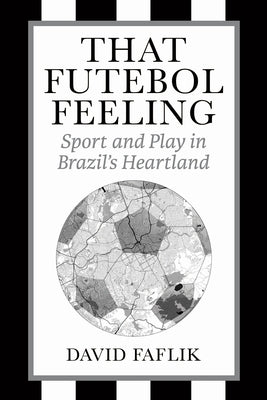Description
Futebol, or soccer for Americans, is the planet's spectator sport of choice. In the Brazilian state of Minas Gerais, nestled in the country's southeastern heartland, futebol generates powerful, lifelong emotions. That Futebol Feeling captures the region's enthrallment with "the beautiful game," and shows us how and why play is central to the human condition. David Faflik profiles members of the most celebrated local team, Clube Atlético Mineiro (CAM), as well as its passionate, never-say-die fans, to show how futebol and fandom shape their everyday lives and perspectives. He discovers bonds of work and play, as well as pride, identity, and community. Additionally, Faflik's analysis of Brazil's futebol culture reflects sports fandom worldwide. CAM stands as a symbol for a way of life in Minas Gerais, the birthplace of Pelé. Faflik interrogates what playing the game means to those who dedicate their lives to the sport. He writes, "The feelings that football inspires are the best of me." That Futebol Feeling shares that special feeling with the rest of us.
Author: David Faflik
Publisher: Temple University Press
Published: 02/07/2025
Pages: 202
Binding Type: Paperback
Weight: 0.53lbs
Size: 8.25h x 5.50w x 0.44d
ISBN13: 9781439926055
ISBN10: 1439926050
BISAC Categories:
- Sports & Recreation | Soccer
- Social Science | Cultural & Ethnic Studies | Caribbean & Latin American Studi
- Sports & Recreation | Cultural & Social Aspects
Author: David Faflik
Publisher: Temple University Press
Published: 02/07/2025
Pages: 202
Binding Type: Paperback
Weight: 0.53lbs
Size: 8.25h x 5.50w x 0.44d
ISBN13: 9781439926055
ISBN10: 1439926050
BISAC Categories:
- Sports & Recreation | Soccer
- Social Science | Cultural & Ethnic Studies | Caribbean & Latin American Studi
- Sports & Recreation | Cultural & Social Aspects
About the Author
David Faflik is Professor of English at the University of Rhode Island. He is the author of Boarding Out: Inhabiting the American Urban Literary Imagination, 1840-1860; Melville and the Question of Meaning; Urban Formalism: The Work of City Reading; Transcendental Heresies: Harvard and the Modern American Practice of Unbelief; and The Literary Gift in Early America.

